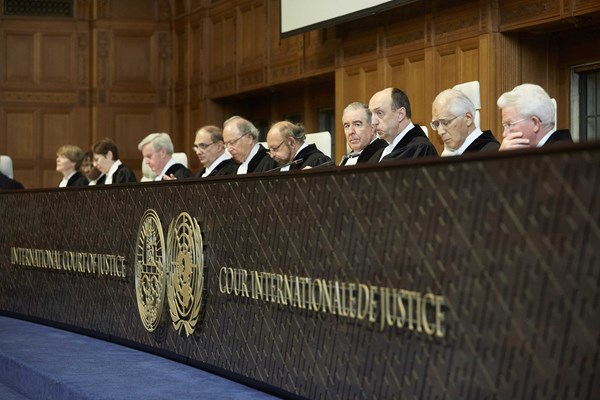Ukraine versus Russia at the Hague: court agrees to take measures against Russia to protect minorities in the Crimea, but has not 'seen evidence of Russia financing terrorism in the Donbas'
In January 2017, Ukraine initiated a lawsuit against Russia at the UN’s International Court of Justice (ICJ) in the Hague. Kyiv is accused Moscow of violating two UN conventions, namely the Terrorist Financing Convention and the Elimination of All Forms of Racial Discrimination. On April 19, the court in the Hague published several rulings on this case. The verdict was read by presiding judge Ronny Abraham.
Notably, the ICJ acknowledged its jurisdiction over Ukraine’s case against Russia. “The Court believes that at least some of Ukraine’s arguments fall under the prima facie jurisdiction of the Court,” Ronny Abraham said.
The court stated that Ukraine had not provided sufficient evidence of Russia financing terrorism. Abraham emphasized that Ukraine was supposed to provide an evidential basis which would attest that the requested temporary measures would stop the infliction of irreparable damage, as well as evidence of the intentionality of Russia’s actions.
The ICJ also agreed to introduce measures in Ukraine’s case against Russia for the failure to protect the national minorities in the Crimea. The court ruled that some of the evidence provided by Ukraine corresponds to the definition of discrimination, for example education in the Ukrainian language. The Court also recognized the Crimean Tatars and ethnic Ukrainians living in the annexed peninsula as vulnerable.
The court ruling required Russia to allow the Mejlis of the Crimean Tatar people to function, and to provide access to education in the Ukrainian language on the peninsula.
Furthermore, the court required Ukraine and Russia to completely implement all the provisions of the Minsk agreements.
Mustafa Dzhemilev, representative of the Ukrainian president on matters of the Crimean Tatar people, stated in a comment on the Krym.Realii news outlet that Russia is unlikely to implement the court’s ruling on the elimination of racial discrimination.
“No, of course it [Russia] won’t implement it, despite the fact that the court’s ruling has major significance. This is definitely moral support for the Crimean Tatars who are being persecuted,” Dzhemilev said.
Ukraine’s Foreign Ministry has already commented on the Hague’s ruling. Deputy Foreign Minister Olena Zerkal stated on her Facebook page that she considers the ICJ’s approach constructive, despite its refusal to approve temporary measures to oppose the financing of terrorism in the Donbas.
“This ruling has recognized the severity of the situation which Russia’s actions are leading to, and Ukrainian citizens need protection. This concerns the Crimea as well as the Donbas, which the court clearly noted. Sadly, the International Court of Justice does not consider it advisable to adopt temporary measures also with respect to Russia’s actions in Eastern Ukraine” Zerkal wrote. She noted: “considering this is the court’s first ruling on this convention, the court’s approach is very constructive”.
Zerkal added that the date of the start of the case processing will be determined by the ICJ in May 2017.
Ukrainian President Petro Poroshenko called the court’s ruling “promising”.
“We are confident that today we are on the right track. We hope for a successful consideration of the cases in question,” the Ukrainian head of state resumed.
